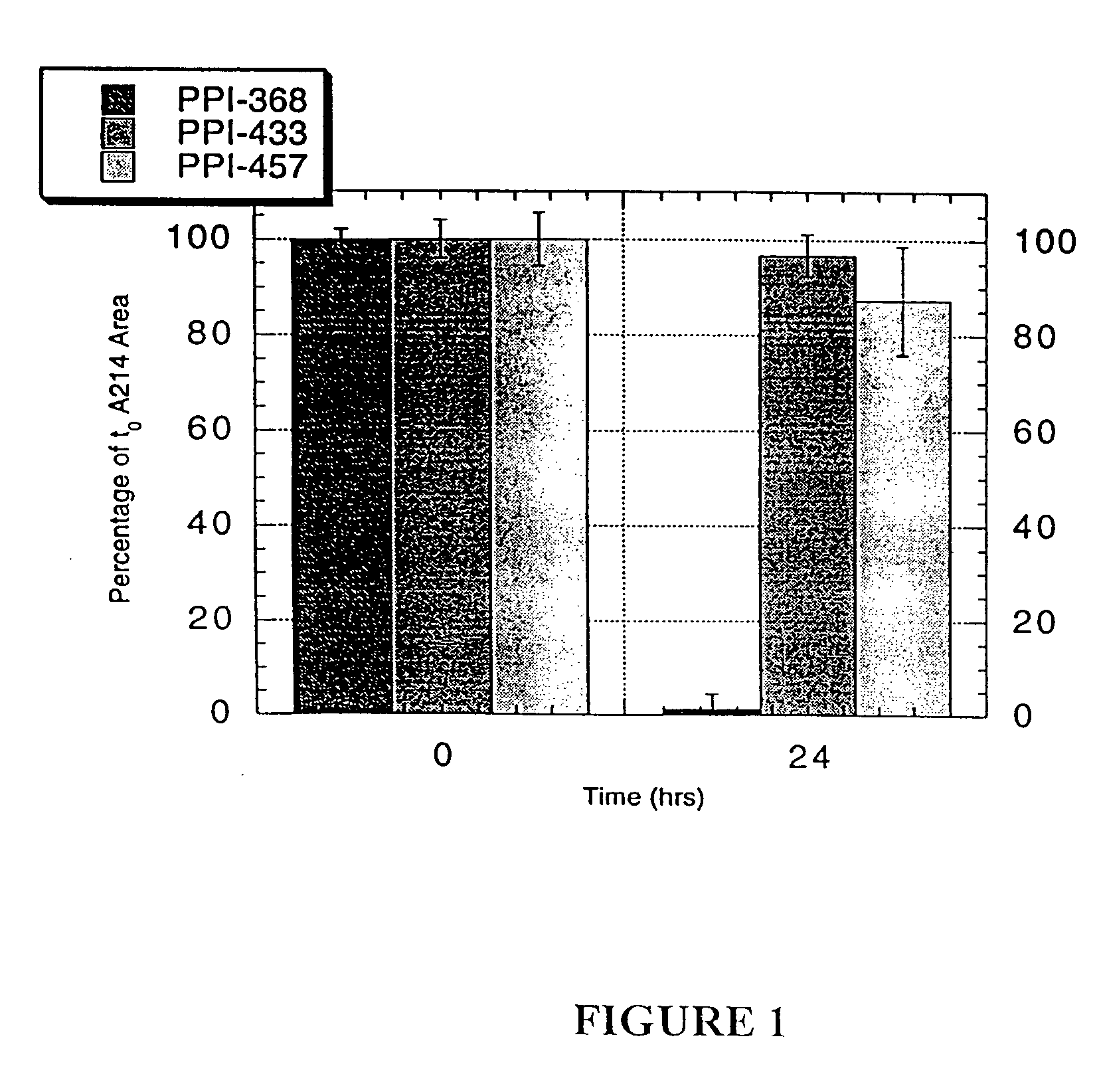Modulators of beta-amyloid peptide aggregation comprising D-amino acids
a technology of beta-amyloid peptide and d-amino acids, which is applied in the field of modulators of beta-amyloid peptide aggregation comprising damino acids, can solve the problems of no treatment that significantly retards the progression of the disease, the societal cost of managing ad is upwards of 80 billion dollars annually, and the control and treatment of ad will become a health care problem. significant, the effect of increasing the ability of the compound
- Summary
- Abstract
- Description
- Claims
- Application Information
AI Technical Summary
Benefits of technology
Problems solved by technology
Method used
Image
Examples
example 1
Preparation of β-amyloid Modulator Compounds Comprising D-Amino Acids
[0126]β-amyloid modulators comprising D-amino acids can be prepared by solid-phase peptide synthesis, for example using an Nα-9-fluorenylmethyloxycarbonyl (FMOC)-based protection strategy as follows. Starting with 2.5 mmoles of FMOC-D-Val-Wang resin, sequential additions of each amino acid are performed using a four-fold excess of protected amino acids, 1-hydroxybenzotriazole (HOBt) and diisopropyl carbodiimide (DIC). Recouplings are performed when necessary as determined by ninhydrin testing of the resin after coupling. Each synthesis cycle is minimally described by a three minute deprotection (25% piperidine / N-methyl-pyrrolidone (NMP)), a 15 minute deprotection, five one minute NMP washes, a 60 minute coupling cycle, five NMP washes and a ninhydrin test. For N-terminal modification, an N-terminal modifying reagent is substituted for an FMOC-D-amino acid and coupled to a 700 mg portion of the fully assembled pept...
example 2
β-Amyloid Aggregation Assays
[0132] The ability of β-amyloid modulator compounds to modulate (e.g., inhibit or promote) the aggregation of natural β-AP when combined with the natural β-AP can be examined in one or both of the aggregation assays described below. Natural β-AP (β-AP1-40) for use in the aggregation assays is commercially available from Bachem (Torrance, Calif.).
A. Nucleation Assay
[0133] The nucleation assay is employed to determine the ability of test compounds to alter (e.g. inhibit) the early events in formation of β-AP fibers from monomeric β-AP. Characteristic of a nucleated polymerization mechanism, a lag time is observed prior to nucleation, after which the peptide rapidly forms fibers as reflected in a linear rise in turbidity. The time delay before polymerization of β-AP monomer can be quantified as well as the extent of formation of insoluble fiber by light scattering (turbidity). Polymerization reaches equilibrium when the maximum turbidity reaches a platea...
example 3
Analysis of β-Amyloid Modulator Compounds Comprising D-Amino Acids
[0142] In this example, D-amino acid-containing modulator compounds designed based upon the AP aggregation core domain Aβ17-21 were prepared and tested for their ability to inhibit aggregation of natural β-amyloid peptide using aggregations assays as described in Example 2. Abbreviations used in this example are: h- (free amino terminus), -oh (free carboxylic acid terminus), -nh2 (amide terminus), CA (cholyl, the acyl portion of cholic acid), PEA (phenethylamide) and d (D-amino acid). Compounds in which the amino acid residues are in parentheses and preceded by “d” indicate that all amino acid residues are D-amino acids. For example, d(LVFFA) indicates D-Leu-D-Val-D-Phe-D-Phe-D-Ala.
[0143] The results from a first series of experiments, using N-terminally-cholyl modified compounds, are summarized below in Table I. The modulator compounds were evaluated in nucleation assays utilizing 5 μM Aβ1-40 and either 2 or 5 μM t...
PUM
| Property | Measurement | Unit |
|---|---|---|
| Linear resolution | aaaaa | aaaaa |
| Linear resolution | aaaaa | aaaaa |
| Linear resolution | aaaaa | aaaaa |
Abstract
Description
Claims
Application Information
 Login to View More
Login to View More - R&D
- Intellectual Property
- Life Sciences
- Materials
- Tech Scout
- Unparalleled Data Quality
- Higher Quality Content
- 60% Fewer Hallucinations
Browse by: Latest US Patents, China's latest patents, Technical Efficacy Thesaurus, Application Domain, Technology Topic, Popular Technical Reports.
© 2025 PatSnap. All rights reserved.Legal|Privacy policy|Modern Slavery Act Transparency Statement|Sitemap|About US| Contact US: help@patsnap.com



